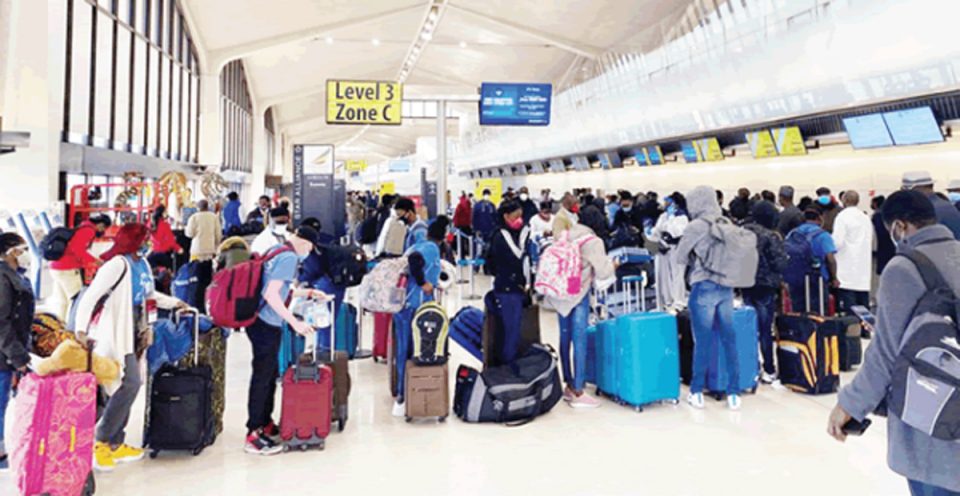Returnee students recount ordeal in Sudan, Egypt
After nearly three weeks trapped in war-torn Sudan, and another week stranded in Egypt over visa and border clearance issues, no fewer than 376 stranded Nigerian returnees touched down the Nnamdi Azikiwe International Airport, Abuja on Wednesday night on board an Air Peace Airline and Nigeria Air Force (NAF) aircraft.
Their arrival followed President Muhammadu Buhari’s intervention which led to the resolution of challenges that hampered their safe passage through Egypt.
They were received by a delegation of the Federal Government comprising Minister of Humanitarian Affairs, Disaster Management and Social Development, Sadiya Umar Farouk, Director General, National Management Emergency Agency (NEMA), Ahmed Mustapha and Chairman/CEO of the Nigerians in Diaspora Commission (NIDCOM), Abike Dabiri-Erewa.
It was reported that some of them had to leave behind luggage in order to enter the aircraft.
Narrating their horrific experience, to an online medium at the Abuja airport on arrival, Zainab, one of the evacuees, said they had lost hope of survival in Sudan.
The 300-level physiotherapy student said they were not treated like humans at the Aswan border in Egypt, describing their condition as “really terrible and totally hard.”
“When the war started, I didn’t know because we were sleeping, we just started hearing gunshots and rockets and we had to leave where we were for safety,” she said.
“We had to leave Khartoum for Egypt and it was totally hard for us. Some of us don’t have money and life there was very expensive. There were pregnant women and children who were sick. We didn’t think we would survive it because we slept in the car. All of our lives were in the car. Life there was totally hard and they treat us like we are not human beings at the Aswan border in Egypt where we spent about six days.”
Akinola Barakat, another student, said the journey from Sudan to the Aswan border took them about a week, noting that the war happened “all of a sudden and we never expected it.”
“We had issues at the border. Sudan border to Egypt, that was where they gave us issues. We spent almost a week there and the journey wasn’t easy at all,” she said.
“It was all of a sudden. We never expected it. We just woke up in the morning and started hearing the sounds of bombs and everyone had to start fleeing. I left Nigeria to study in Sudan because studying in Nigeria is not easy. I studied at the International University of Africa.”
A returnee female student spoke of the humiliations they faced including having to sleep in the open.
“We spent all the money we had. We were so hungry and thirsty. They were harassing us sexually. There was no food, no water to drink. It got to a point we picked things from shops and ran away,” the returnee female student spoke of her excruciating experience among other Nigerians while at the border between Sudan and Egypt.
Another female student told the BBC Hausa Service in an interview, that their legs were swollen due to long hours of stay in the buses.
A male student said the situation was so bad that they even had to pay money before they were allowed to urinate, and hoped the war would soon end to enable him go back to Sudan and complete just a semester to round up his programme.
Farouq said each of the returnees would be given N100,000 to enable them settle in.
Meanwhile, Muhammad Yusuf, Sudan’s ambassador to Nigeria, has asked the evacuees to return to the North African country after the crisis He made the request, yesterday, after some of the evacuated Nigerians arrived at the Nnamdi Azikwe International Airport, Abuja.
He asked them to consider Sudan as their second country, expressing optimism that the crisis would soon be over.
“The situation in Khartoum is calming down and the army is going to soon control the whole territory. I’m very sorry for what is happening there, but at the same time I’m very happy to have these evacuees coming from Sudan safe, no life is lost. Nigerians are coming from their second country now to their home countries.
“I hope that things will be controlled there (Sudan) and safety would be back and rehabilitation will be started and you can come back to your second country to pursue and continue your studies for those who are students and for others who have business there.”
He said the government had proposed another humanitarian truce but insisted that there would be no negotiations between the army and the Rapid Support Forces (RSF).
“About the truce, yes, there is a proposal to have a truce for seven days. The government of Sudan has given its acceptance to this truce for only humanitarian purpose to make way for people who are trapped to get their basic needs like food, shelter, water, medicine. But, definitely as announced by the government of Sudan, no direct negotiations will be held between the rebels and the legitimate army.”




